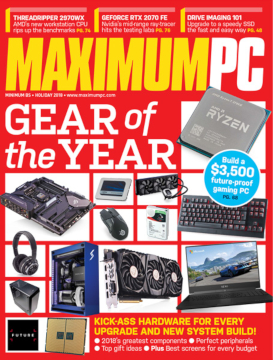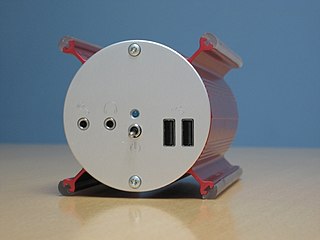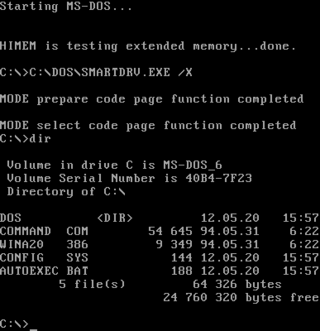
In computing, BIOS is firmware used to provide runtime services for operating systems and programs and to perform hardware initialization during the booting process. The BIOS firmware comes pre-installed on an IBM PC or IBM PC compatible's system board and exists in some UEFI-based systems to maintain compatibility with operating systems that do not support UEFI native operation. The name originates from the Basic Input/Output System used in the CP/M operating system in 1975. The BIOS originally proprietary to the IBM PC has been reverse engineered by some companies looking to create compatible systems. The interface of that original system serves as a de facto standard.

A motherboard is the main printed circuit board (PCB) in general-purpose computers and other expandable systems. It holds and allows communication between many of the crucial electronic components of a system, such as the central processing unit (CPU) and memory, and provides connectors for other peripherals. Unlike a backplane, a motherboard usually contains significant sub-systems, such as the central processor, the chipset's input/output and memory controllers, interface connectors, and other components integrated for general use.

In computing, booting is the process of starting a computer as initiated via hardware such as a button or by a software command. After it is switched on, a computer's central processing unit (CPU) has no software in its main memory, so some process must load software into memory before it can be executed. This may be done by hardware or firmware in the CPU, or by a separate processor in the computer system.

Rollo was a Viking who, as Count of Rouen, became the first ruler of Normandy, today a region in northern France. He emerged as the outstanding warrior among the Norsemen who had secured a permanent foothold on Frankish soil in the valley of the lower Seine. After the Siege of Chartres in 911, Charles the Simple, the king of West Francia, granted them lands between the mouth of the Seine and what is now Rouen in exchange for Rollo agreeing to end his brigandage, swearing allegiance to him, religious conversion and a pledge to defend the Seine's estuary from Viking raiders.

Brain is the industry standard name for a computer virus that was released in its first form on 19 January 1986, and is considered to be the first computer virus for the IBM Personal Computer and compatibles.

Maximum PC, formerly known as boot, is an American magazine and website published by Future US. It focuses on cutting-edge PC hardware, with an emphasis on product reviews, step-by-step tutorials, and in-depth technical briefs. Component coverage areas include CPUs, motherboards, core-logic chipsets, memory, videocards, mechanical hard drives, solid-state drives, optical drives, cases, component cooling, and anything else to do with recent tech news. Additional hardware coverage is directed at smartphones, tablet computers, cameras and other consumer electronic devices that interface with consumer PCs. Software coverage focuses on games, anti-virus suites, content-editing programs, and other consumer-level applications.

The Net Yaroze is a development kit for the PlayStation video game console. It was a promotion by Sony Computer Entertainment to computer programming hobbyists which launched in June 1996 in Japan and in 1997 in other countries. It was originally called "Net Yarouze", but was changed to "Net Yaroze" in late 1996. Yarōze means "Let's do it together".

A bootloader, also spelled as boot loader or called bootstrap loader, is a computer program that is responsible for booting a computer. If it also provides an interactive menu with multiple boot choices then it's often called a boot manager.

The FM Towns is a Japanese personal computer built by Fujitsu from February 1989 to the summer of 1997. It started as a proprietary PC variant intended for multimedia applications and PC games, but later became more compatible with IBM PC compatibles. In 1993, the FM Towns Marty was released, a game console compatible with existing FM Towns games.

King's Quest: Quest for the Crown is an adventure game developed by Sierra On-Line and published originally for the IBM PCjr in 1984 and later for several other systems between 1984 and 1989. The game was originally titled King's Quest; the subtitle was added to the games box art in the 1987 re-release, but did not appear in the game.
Voodoo Computers Inc. or VoodooPC was a luxury personal computer brand and company. Voodoo was originally started as a niche PC maker in Calgary, Alberta, Canada. It was founded in 1991, and acquired by Hewlett-Packard in 2006. Voodoo specialized in desktop high performance computing. By 2013 the Voodoo name was no longer used, and was replaced by the brand name Omen, which used the same logo until 2020.

The CD64 is a game backup device made by UFO/Success Company for the Nintendo 64 that allows users to run ROM files off a CD-ROM attached to the system. Similar to the Doctor V64 and the Z64 units for the N64, it is most commonly used for playing backups of Nintendo 64 games. Since it has a built-in communications port that is accessible from the N64 program, it can also be used as a rather versatile development/debug device.
A self-booting disk is a floppy disk for home computers or personal computers that loads—or boots—directly into a standalone application when the system is turned on, bypassing the operating system. This was common, even standard, on some computers in the late 1970s to early 1990s. Video games were the type of application most commonly distributed using this technique.

ThinCan is a thin client manufactured by Estonian electronic design start-up Artec Group. The ThinCan remained relatively unknown outside Estonia until 2006, when a recent ThinCan iteration was selected as the hardware base for the Linutop, a network appliance that greatly stimulated the market for lightweight computing platforms. The ThinCan was also commercialized by SmartLink under the Revnetek brand name.
Windmill Software is a Canadian software company. Windmill Software today publishes property management software and management information system software, but the company is more notable for its past role as a developer, marketer, publisher, and distributor of computer and video games. The company developed several games for the IBM PC in the early 1980s. Windmill Software was acquired by Dude Solutions in March 2015.

DOS is a family of disk-based operating systems for IBM PC compatible computers. The DOS family primarily consists of IBM PC DOS and a rebranded version, Microsoft's MS-DOS, both of which were introduced in 1981. Later compatible systems from other manufacturers include DR-DOS (1988), ROM-DOS (1989), PTS-DOS (1993), and FreeDOS (1998). MS-DOS dominated the IBM PC compatible market between 1981 and 1995.
A master boot record (MBR) is a special type of boot sector at the very beginning of partitioned computer mass storage devices like fixed disks or removable drives intended for use with IBM PC-compatible systems and beyond. The concept of MBRs was publicly introduced in 1983 with PC DOS 2.0.

Cowboy boots are a specific style of riding boot, historically worn by cowboys. They have a high heel that is traditionally made of stacked leather, rounded to pointed toe, high shaft, and, traditionally, no lacing. Cowboy boots are normally made from cowhide leather, which may be decoratively hand-tooled, but are also sometimes made from "exotic" skins like alligator, snake, ostrich, lizard, eel, elephant, stingray, elk, buffalo, and so on.
The Linux kernel can run on a variety of devices made by Apple, including devices where the unlocking of the bootloader is not possible with an official procedure, such as iPhones and iPads.













